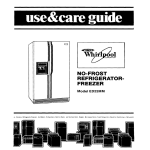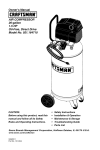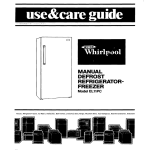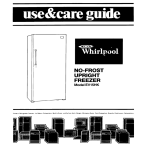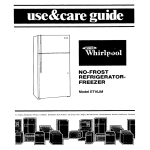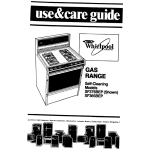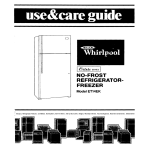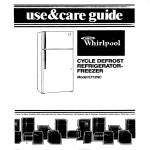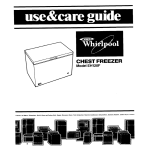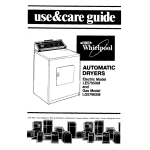Download Whirlpool ELl5CCXR User's Manual
Transcript
MANUAL DEFROST REFRIGERATORFREEZER Model ELlSCCXR ers. Freezers, Relrlgerator-Freezers, Ice Makers, Olshwashers, Bwlt-In Ovens and Surlace Units, Ranges, MIcrowave Ovens. Trash Compactors, Room Air Condltloners, Oehumldlf Please read this Use and Care Guide before you do anything else.. . This booklet tells you how to start your refrigerator, clean it, move shelves and adjust controls. It even tells you what new sounds to expect from your refrigerator. Treat your new refrigerator with care. Use it only to do what home refrigerators are designed to do. Stationary Extra Cold Shelves Parts and features Comaartment Crisper Cover . Copy your Model and Serial Numbers here. . . When you need service 01 call with a question. have this informatlon ready: Model Number 1. Complete Model and Serial Numbers (from the plate located as shown). Serial Number 2. Purchase date from sales slop. Purchase Date Copy this Information in these spaces. Keep this book. your warranty and sales slip together in a handy place. I 2 Service Company and Telephone Number Contents SAFETY FIRST. BEFORE YOU PLUG IT IN Install Properlv Level Refrigerator, :::::::: Remove Sales Labels Clean It Plugltln TurnItOn USING YOUR REFRIGERATOR. Setting the Control The Freezer Tray Changing the Light Bulb Adjusting the Shelves Removing Crisper and Crisper Cover Ice Cube Trays Sounds You May Hear Energy Saving Tips DEFROSTING AND CLEANING YOUR REFRIGERATOR Defrosting the Freezer Compartment. Cleaning the Refrigerator, Cleaning Chart FOOD STORAGE GUIDE. VACATION AND MOVING CARE, IF YOU NEED SERVICE OR ASSISTANCE I, Before You Call for Assistance 2. If You Need Assistance 3. IfYouNeedService 4. IfYouHaveaProblem... ,..,.., 5 5 6 6 6 1 ., Page 6 6 7 7 7 8 9 10 11 11 11 11 11 1 ; ; 1 i ; f : : “,. 01985 Whirlpool Corporation Before you plug it in IMPORTANT Before using your refrigerator, you are personally responsible for making sure that it... l is installed and leveled on a floor that will hold the weight, and in an area suitable for its size and use. l is connected only to the right kind of outlet, with the right electrical supply and grounding. [Refer to your “Electrical Requirements and Grounding Instructions:‘) l is used only for jobs expected of home refrigerators. l l l l l l is not near an oven, radiator or other heat source. is properly maintained. is out of the weather. is used in an area where the room temperature will not fall below 55” F (13” C). is not used by those who may not understand how it should be used. is not loaded with food before it has time to get properly cold. 3 Install properly.. Remove sales labels.. . . Remove the Consumer Buy Guide label, tape and any inside labels before ustng the refrigerator To remove any remaining glue: 1 Rub briskly with thumb to make a ball then remove OR 2. Soak area with dishwashing detergent solution (1 teaspoon detergent in 1 quart warm water] before removing glue as described in step 1. DO NOT USE rubbing alcohol or flammable or toxic solvents, such as acetone, gasoline, carbon tetmchloride, etc. These can damage the material. NOTE: DO NOT REMOVE ANY PERMANENT INSTRUCTION LABELS INSIDE YOUR REFRIGERATOR. Do not remove the Tech Sheet fastened under the refrigemtor at the front. Clean it... Clean your refrigerator before plugging it. See cleaning Instructions on page 7 Plug it il I... 3-prong grounding type wall receptacle 1 Allow 3 Inches (7 5 cm] between overhead cabinets and the refrigerator top 2 Allow at least an Inch (2 5 cm) between the refrlgerator condenser and the wall 3. Allow % inch (1.25 cm) space on each side and at top of the refrigerator for ease of installation. 4 If the refrigerator ISto be against a wall, you might want to leave enough space so the door can be opened wider y”l”!1 Level refrigerator.. . v grounbingplug Refrigerator Power Cord Lower I. Keep the 4 bolts that held refrigerator in shipping crate. They are the levelling legs. 2. Screw these bolts all the way into bolt holes at the bottom corners of refrigerator. 3. Adjust each leg until the refrigerator won’t rock. Slide refrigerator into place. 4. Adjust front legs to level the refrigerator. - To raise corners, turn legs in direction shown -To lower corners, turn legs in direction shown. 5. Check with level 4 1 .. ? RECOMMENDEDGROUNDING Raise it in or using METHOD A 115 Volt, 60 Hz., AC only, 15 or 20 ampere fused grounded electrlcal supply is required. It is recommended that a separate circuit serving only this appliance be provided. Do not use an extension cord. Use a receptacle which cannot be turned off with a switch or pull chain. See individual electrical requirements and grounding instruction sheet in your literature package. Turn it on... RUN OFF i I c- RUN SWITCH .- fi Move run switch to RUN NOTE: The refrigerator motor will not operate til the run switch is on RUN. un- Using your refrigerator Setting the control . . . The control for the refrigerator temperature the refrigerator When the refrigerator IS plugged and the run switch is moved to RUN l IS in in Give the refrigerator time to cool down completely before adding food. (This may take several hours ) This setting should be about right for normal household refrigerator usage. The control will be set about right when milk or juice is as cold as you like. In hot weather or if the door is opened often, turn the control to a higher number to keep the temperature you like If the milk or juice is too cold or refrigerator items start to freeze, turn the control to a lower number or adjust the freezer tray damper. Wait 24 hours after an adjustment is made before further chanae is made to the controls Set the THERMOSTAT CONTROL to 3 The freezer tray.. The freezer tray is located under the freezer compartment. The damper at the rear of the freezer tray helps control the refrigerator temperature for warm weather operation. The damper can be adjusted for proper cooling and defrosting of the refrigerator: To adjust the damper: I. Pull out the freezer tray. 2. Lift out the damper from the rear of the tray. 3 Slide damper into the desired position. Damper \ Positions \ A - [Closed] B ~ Cu E - [FULL Open) - +sition for normal cooling and defrosting NOTE: “B, C, D” positions provide fine cooling adjustments to best meet your cooling needs in warm weather. weather Changing WARNING: the light bulb... Before removing the light bulb, either unplug the refrigemtor or disconnect the electricity leading to the refrigemtor at the main power supply. Shock and injury can occur if electricity remains connected. I, Reach behind control console to find bulb. 2 Remove bulb. 3. Replace with a 40.watt (maximum) appliance bulb setting. Adjusting I. 2. 3 4. the shelves... Guide First, remove food from shelf. Slide shelf straight out to stop Lift front. Slide the rest of the way out Shelf Sf Replacing Shelf: I. Frt back of shelf on top of guides with wrre stops on the bottom of gurdes. 2 Lrft front, slide shelf in until It clears gurde stops Removing cover.. . crisper k--lShelf Guide and crisper Lift the Front, Then the Back I to stop II Agaln Ice cube trays.. . Removing Crisper: I. Slide crisper strarght out to stop 2. Lift the front. 3. Slide the rest of the way out 4. Replace in reverse order. Removing Cover: I, Lift front, then lift back. 2. Pull up and out. Replacing Cover: 1 Frt notches on back of cover into back on wall of refrigerator. 2 Lower front Into place. supports For best results when freezing ice cubes, place ice cube trays side-by-side in bottom of freezer compartment. If cubes are not used, they may shrink. The longer cubes are stored, the smaller they get. To remove ice: 1. Hold tray at both ends. 2. Slightly twist. Sounds you may hear... Your new refrigerator may make sounds that your old one didn’t. Because the sounds are new to you, you might be concerned about them Don’t be Most of the new sounds are normal. Hard surfaces lrke the floor, walls and cabrnets can make the sounds seem louder. The followrng chart describes the kinds of sounds that might be new to you. and what may be makrng them Possible Sounds: Probable Causes: l Water Sounds: When the refrigerator stops running, you may hear gurgling few minutes after it stops. l Running Your refrigerator has a high-efficiency compressor and motor It \vill run longer than older desrgns. It may even seem to run most of the time. Sounds: in the tubing for a Energy saving tips.. . You can help your refrigerator use less electrrcity. Check door gaskets for a tight seal. Level the cabinet to be sure of a good seal. l Clean the condenser coil regularly. l Open the door as few times as possible. Think about what you need before you open the door Get everything out at one time. Keep foods organized so you won’t have to search for what you want. Close door as soon as food is removed. l Go ahead and fill up the refrigerator, but don’t overcrowd it so air movement is blocked. l l 6 l It is a waste of electricity to set the refrigerator and freezer temperatures colder than they need to be. If ice cream is firm in the freezer and drinks are as cold as your family likes them, that’s cold enough. Make sure your refrigerator is not next to a heat source such as a range, water heater, furnace, radrator, or in direct sunlight. Defrosting and cleaning your refrigerator The freezer compartment in your refrigerator should be defrosted whenever frost builds up to ‘/s-inch (6 mm]. The entire refrigerator should be cleaned about once a month to help prevent odors from building up. Of course, spills should be wiped up right away. Defrosting the freezer compartment.. . 1. Move the Run Switch to “OFF:’ 2. Remove food and ice cube trays. Wrap food in newspaper and put in a cooler to keep frozen. 3. Make sure the freezer tray damper is in the ‘W’ position, 4. Place a pan of hot water in the freezer compartment to speed defrosting. Leave door open. 5. CAUTION: Do not use any type of electric defroster or sharp utensils (ice pick, knife, etc.] to speed defrosting. These can cause damage Scrape with plastic window scraper 6. Replace hot water every 10 to 15 minutes. 7. Soak up defrost water with a cloth or sponge. cooing Cleaning ition for normal and defrosting. the refrigerator... To clean your refrigerator, move the Run Switch to OFF, unplug it, take out all removable parts, and clean it according to the following directions. When cleaning is complete, replace all refrigerator parts, plug it in, and move the Run Switch to RUN. 8. Empty defrost water from freezer tray [Pull out to stops; lift front slightly; pull out the rest of the way.) 9. Clean compartment and freezer tray with a solution of two tablespoons (26 g] of baking soda and one quart (.95 I) of warm water Rinse well and dry 10. Replace food and ice cube trays 11. Move the Run Swatch to RUN Cleaning chart.. . Part what Removable parts (shelves, crisper, etc.) Sponge or cloth; mild detergent and warm water. Outside to use How to clean Sponge, cloth or paper towel; mild detergent, appliance wax [or good auto paste wax) Wash removable parts with warm water and a mild detergent. Rinse and dry l l l l l Waxing Inside walls [freezer compartment should be allowed to warm up so cloth won’t stick.] painted metal Sponge, soft clolh or paper towel, baking soda, warm water, mrld detergent surfaces l l Docx loners and gaskets Sponge, soft cloth or paper towel, mrld detergent, warm water DO NOT USE Cleaning bleaches or cleansers Dark Plastics (covers and panels) Mrld detergent and warm water, soft, clean sponge and soft, clean cloth Wash with warm water and a mild detergent Do not use abrasive or harsh cleansers. Rinse and dry Wax painted metal surfaces at least twice a year with appliance wax or a good auto paste wax. Apply wax with a clean, soft cloth. Do not use wax on plastic parts. l l provides rust protection. Wash with warm waler and - mrld detergent or -baking soda (2 tablespoons 1 quart ( 95 I) warm water Rrnse and dry Wash wrth mrld detergent water Rinse and dry waxes, concentrated contalnlng petroleum l l detergents, on plastic t 26 g] to and warm parts. Wash wrth a soft grlt-free cloth or sponge Rinse and dry with a damp grit-free cloth or chamois DO NOT USE paper towels, window sprays, scouring cleansers, or flammable or toxic solvents like acetone, gasoline, carbon tetrachloride, etc. These can scratch or damage the material. Condenser coils Floor under refrigerator Use vacuum cleaner with brush attachment Usual Floor attachment. l l l l l 8 Clean dust and lint from condenser coils behind the refrigerator at least every other month Be careful, the fins on the coils are sharp. Slide refrigerator out away from wall Wash floor. Slide refrigerator back into place. Check to see if the refrigerator is level. Food storage guide leafy vegetables (lettuce. celery and parsley) Before storing, remove the store wrap and trim off brursed areas Wash In cool water and dram slightly dater should be clrnglng to the greens as they go nto the crrsper ‘his water provides the atmosphere Jf hrgh humldi+,y necessary for keeping the leafy vegetables fresrl and crisp durrng storage Vegetables wlth sklns [tomatoes flash. dry and s:ore in a crrsper Fresh meat, prepackaged by the meat retailer Store In refrigerator in the origInal wrapping Refer to the chart following, for recommended refrigerator storage times Fresh meat, not prepackaged Remove from the market wrapping paper, wrap loosely In waxed paper or aluminum foil Refer to chart oh this page for recommended storage times Prepackaged frozen meat Place In the freezer compartment or freezer tray Immediately after purchase unless it IS to be defrosted for cooking Cool wlthin one to two Cooked meats (leftovers) hours after cooklng, then cover or wrap tightly with plastrc wrap or aluminum foil to prevent drying, and store In the refrigerator. Bones may be removed to conserve storage space, but meat should be left in as large a piece as possible Meats cooked ir liquid for future serving should be cooled uncovered, wrthtn one to two hours, then cov ered and stored In the refrigerator To speed cooling, when meat IS cooled tn liquid, the pan containing the cooked meat may be set where there IS good circulation of cool air, or t may be cooled by setting the pan IV cold or runnlnc water Cured and smoked meats Keep best in original wrapping After opening, rewrap tightly in plastic wrap or aluminurrl foil Cooked meat Wrap or cover tightly wrap or aluminum3 foil of Nat’1 Live Stock and Meat STORAGECHARTFOB FRESHAN0 CUBEDMEAT- and peppers) Frults Wash, a:y and store in a crrsper with vegetables such as ‘omatoes Berries keep better If not dashed or hulled until ready to use. Sort, then store berries ID CI loosely closed paper bag and store on refrrgerator shell Meat* .Meat ISperrshable and proper care IS essential to marntarnng I?Skeeping quallt!es Store fresh meat on the Interior refrigerator shelves. Refer to the chart on this page for recommended refrigerator food storage times ‘Courtesy Cold cuts Store them in thelrorlgrnal wrapping until you are ready to use. Once the package is opened, tightly rewrap unused cold cuts tn plastic wrap or aluninum foil with plastic Board ..... ............... Variety Wats Chicken .......................... Ground Beef.. . . . . . . . . . . . . . . . . . . . . SteakrandPaasts ................ Cured Meats . . . . . . . . . . . . . . . . . . . . . Bacon . . . . . . . . . . . . . . . . . . . . . . . . . . . . Cold Cuts . . . . . . .-. . . . . . . . . , . . . . . . . 1 to2 1 to 2 1 to 2 3to5 7 to10 5to7 3 to5 ‘Ifrnec3ii.sstafedadayortwolon~fhantheabove recamm0nd&lime,wroph&tight~and store in freezer wt. NOTE: Fresh fish and shellfrsh should be used the same day purchased. Eggs Store wrthout washing In the orrgrnal carton or use the egg nest In the door Milk Wipe milk cartons For best storage, place milk on top Interior shelf Beverages Wipe bottles and cans Store on lower door shelves beneath the egg nest or interior shelves. Butter Store dally needs on serving dish In butter compartment. When storing an extra supply, wrap in air-tight packaging and store in freezer compartment or on top door shelves. Cheese Store in orrglnal wrapping until you are ready to use Once the package IS opened, rewrap tightly in plastic wrap or aluminum foil Store on interior refrigerator shelves. Store catsup, mustard, jelly, olives, Condiments pickles, etc on door shelves. NOTE: Store bottled and canned items on door shelves beneath the egg nest. leftovers -Always cover the container with waxed paper, plasttc wrap or aluminum foil to keep food from drying Store on refrigerator shelves. Store on the bottom of the freezer comIce cream partment. Once package IS opened, place a piece of aluminum foil or waxed paper snugly against the surface of the ice cream This will prevent ice crystals from forming Frozen soups, juices .Store in freezer compartment Packaged frozen food Store in freezer compart ment or in the full-width freezer tray. Frozen meats .Wrap In freezer packaging material and store in freezer compartment or freezer tray Ice trays compartment Place on the bottom of the freezer Vacation Short vacations. .. Moving. No need to shut off the refrigerator If you WIII be away for less than four weeks. Use up perishables. Long vacations. .. Remove all the food If you are going for a month or more Move the run switch to OFF, unplug the refrlgeraior and clean It rinse well and dry Tape rubber or wood blocks to the door keeping It open far enough for air to get In This WIII keep odor and mold from building up WARNING: Tape blocks out of a child’s reach . ..do not allow children near the refrigerator when the door is blocked open. They may become injured or trapped. To restart refrigerator, see instructions on page IO 4. .. Remove all food. Pack frozen foods In dry ice. Unplug the refrigerator and clean it thoroughly. Remove everything that comes out Wrap all parts well and tape them together so they don’t shift and rat tie Screw in the levelling legs, tape the doors shut, tape the electric cord to the cabinet When you get to your new home, put everything back and refer to page 4. QUESTIONS? ...call your COOL:LINE” service assistance telephone number (page 111, If you need service or assistance, we suggest you follow these four steps: I. Before calling for assistance.. . Performance problems often result from little things You can find and fix yourself without tools of any kind. If your refrigerator will not operate: l Is the power supply cord plugged Into a live circuit with the proper voltage? [See page 4.) l Have You checked your home’s marn fuses or circuit breaker box? l Is the Run Switch on RUN? If there Is a rattling or jlngllng noise, or other unfamlllar sounds: l Is something on top or behind the refrrgerator makrng norse when the refrigerator is running? If the light does not work: l Have you checked your home’s main fuses or circuit breaker box? l Is the power supply cord plugged into a live circurt with the proper voltage? (See page 4 ) If the bulb Is burned out: l See Instructions for changing light bulbs on page 5. Use applrance bulbs only. If the motor seems to run too much: l Is the condenser, behind the refrigerator, free from dust and lint? l On hot days. or if the room is warm, the motor natu rally runs longer l If the door has been opened a lot, or if a large amount of food has been put in, the motor will run longer to cool down the interior l Is frost build-up more than % inch (6 mm]? Remember: Motor running time depends on drfferent things number of door openings, amount of food stored, temperature of the room, settrng of the control and damper posItion 2. If you need assistance”. .. Call Whlrlpool COOL-LINE o service asslstance telephone number. Dlal free from: Contlnental U.S. . . . . . . . . . . . . (800) 2531301 Mlchlgan . . . . . . . . . . . . . . . . . . . (800) 632-2243 . . . . . . . . . . . (800) 253-1121 Alaska & Hawall and talk wrth one of our trained Consultants. The Consultant can instruct You in how to obtain satisfactory operation from your appliance or, if service IS necessary. recommend a qualified service company in Your area 0 FSP 8 FSP IS a reQlSiered trademark 01 Whirlpocl Corporai~on for quollty parts took for ttls symbol of quality whenever you need a replacement part for your Whfrlpool oppllance FSP replacement parts WIII fit rIghI and work right because they are made lo the same exacting swclhcatfons used to build every new Wh~rlpoo applfance 3. If you need service*... Whirlpool has a nationwide network of franchrsed TECH-CARE@ Service Companies. TECH-CARE service technrcians are trarned to fulfill the product warranty and provide after-warranty servrce. 1 anywhere in the Unrted States To locate TECH-CARE servrce In your area, call our COOL-LINE service dssistance telephone number (see Step 2) or look in your telephone directory Yellow Pages under APPLIANCES-HOUSEHOLDMAJORSERVICE .3 REPAIR WHIRLPOOLAPPLIANCES FRANCHISEDTECH CARESERVICE OR S;EftI’I(6 (‘0 MP4\,ES XYZSERVICE CO 123 MapIP ELECTRICALAPPLIANCESMAJORREPAIRING SEXI~I(‘E XYZSERVICECO 123 Maple 999 9999 h PARTS WHIRLPOOLAPPLIANCES FRANCHISEDTECH CARESERVICE (‘0 MM VIES 999 9999 OR WASHING MACHINES. DRYERS 6 IRONERSSERVICING WHlRLPOOLAPPLlANCES FRANCHISEDTECH-CARESERVICE SEHI’I(‘E(‘OMP.4VIE, XYZSERVICE CO 123t4apie 999 9999 4. If you have a problem:” . . . Call our COOL-LINE service assistance telephone number [see Step 2) and talk with one of our Consultants, or if You prefer, write to: Mr. Robert Stanley Division Vice President Whirlpool Corporation 2000 US-33, North Benton Harbor, Ml 49022 ‘If you must call or wrote. please provide model number, serial number, date of purchase. and a complete descrrptron of the problem This information IS needed In order to better respond to Your request for assistance, 7&idJBUOl Appliances Making your world a little easier. Part No. 945957 Rev. B 01985 Whirlpool Corporation Ice Makers. Dishwashers. BullI-In Ovens and Surface Units. Ranges. krowave Printed in U.S.A. Ovens. Trash Compactors, Room Air Condltlonerr. Dehumlditwrs, Automatic Washers, Clothes Ori













